The Ethical Responsibility of Social Media Platforms
- Last Updated: June 12th, 2025

Attorney Jessie Paluch, founder of TruLaw, has over 25 years of experience as a personal injury and mass tort attorney, and previously worked as an international tax attorney at Deloitte. Jessie collaborates with attorneys nationwide — enabling her to share reliable, up-to-date legal information with our readers.
Legally Reviewed
This article has been written and reviewed for legal accuracy and clarity by the team of writers and legal experts at TruLawsuit Info and is as accurate as possible. This content should not be taken as legal advice from an attorney. If you would like to learn more about our owner and experienced injury lawyer, Jessie Paluch, you can do so here.
Fact-Checked
TruLawsuit Info does everything possible to make sure the information in this article is up to date and accurate. If you need specific legal advice about your case, contact our team by using the chat on the bottom of this page. This article should not be taken as advice from an attorney.
Key Takeaways:
- Social media platforms have transformed communication and public discourse but face ethical challenges around misinformation, hate speech, privacy, and content moderation.
- Social media companies' algorithms can inadvertently amplify false information and create echo chambers that contribute to political polarization in society.
- As governments seek to regulate social media, companies like TruLawsuit Info provide expert legal guidance to hold platforms accountable and protect users' rights in the digital age.
Overview of the Ethical Responsibility of Social Media Platforms
On this page, we’ll discuss an overview of ethical responsibility of Social Media platforms, duties of social media platforms to protect users, how a lack of ethical social media responsibility can potentially lead to harm, and much more.
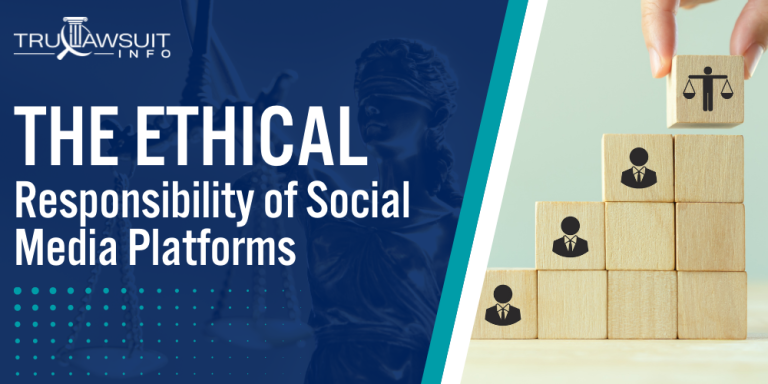
Intro to the Ethical Responsibility of Social Media Platforms
Some of the key aspects of the Ethical Responsibility of Social Media Platforms include, but are not limited to:
- User Safety: Social media platforms have an ethical obligation to ensure the safety of their users, particularly vulnerable populations like minors.
- Content Moderation: Platforms should have robust content moderation policies to prevent the spread of harmful, abusive, or illegal content.
- Data Privacy: Social media companies must protect user data and ensure it is not misused for targeted advertising or other unethical purposes.
- Transparency: Platforms should be transparent about their algorithms, data practices, and content moderation policies to build trust with users.
If you have suffered harm due to a lack of ethical responsibility on social media platforms, you may be eligible to seek compensation.
Contact Tru Lawsuit Info using the chat on this page for an instant case evaluation to determine if you qualify to join others filing social media harm lawsuits.
Table of Contents
Rise of Social Media and Its Societal Impact
In recent years, social media has transformed how societies function, affecting communication, information sharing, and public opinion.
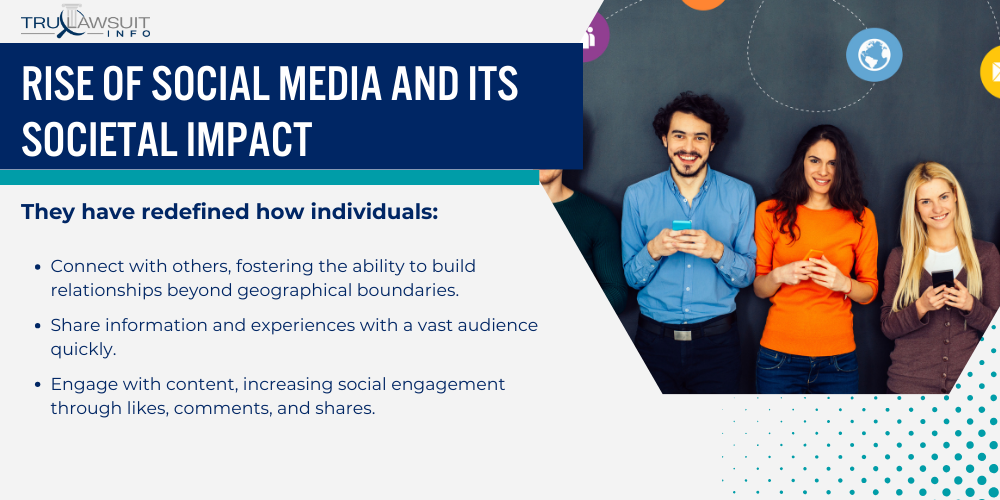
Rapid Growth and Adoption of Social Media Platforms
The social media landscape has evolved dramatically, with platforms like Facebook, Twitter, and Instagram becoming integral to daily life.
They have redefined how individuals:
- Connect with others, fostering the ability to build relationships beyond geographical boundaries.
- Share information and experiences with a vast audience quickly.
- Engage with content, increasing social engagement through likes, comments, and shares.
- Access to news and global events, making social media networks critical sources of information.
The penetration of these social platforms into everyday routines signifies their importance in modern society.
Influence of Social Media on Public Discourse and Opinion
Social media channels have also significantly influenced public discourse and political opinion.
They actively shape dialogues on social and political issues by:
- Serving as hubs where diverse opinions and narratives are amplified.
- Enabling the rapid dissemination of information can sway public sentiment.
- Providing a space for activism and social movements to gain visibility.
- Influencing the communication strategies of organizations and leaders.
The impact on public opinion comes from peer interactions and the algorithms that curate content tailor-made to user preferences.
Misinformation and Fake News on Social Media
Misinformation and fake news have created a significant ethical dilemma for social media platforms.
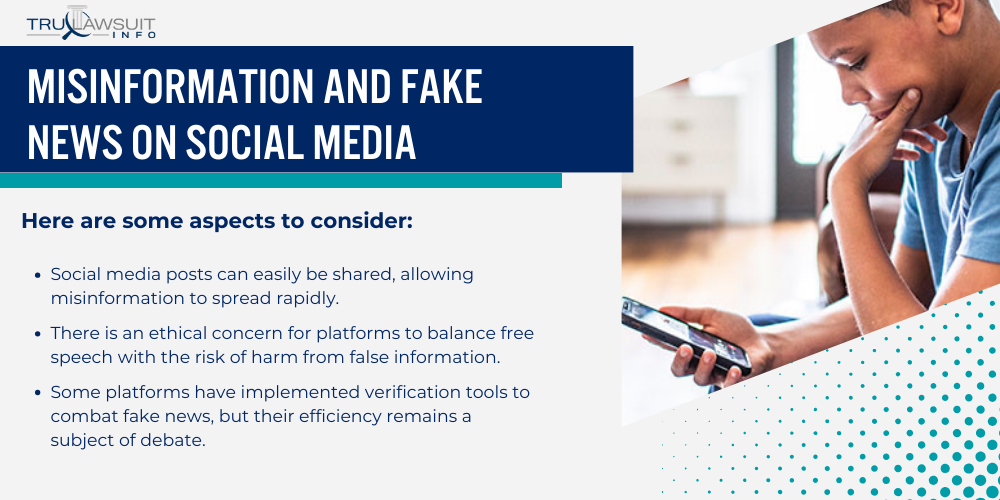
Users encounter false narratives and manipulated content that can quickly go viral, creating widespread impact.
False Information on Social Media Platforms
False information often proliferates on social media due to the nature of the platforms.
Here are some aspects to consider:
- Social media posts can easily be shared, allowing misinformation to spread rapidly.
- There is an ethical concern for platforms to balance free speech with the risk of harm from false information.
- Some platforms have implemented verification tools to combat fake news, but their efficiency remains a subject of debate.
- Ensuring users’ privacy while identifying and removing misinformation is an ongoing challenge.
Algorithms in Amplifying Misinformation
Social media algorithms can inadvertently contribute to the spread of misinformation.
Here’s a brief rundown:
- Algorithms often prioritize engagement, which sensational or controversial content can drive.
- False information may receive more shares, likes, or comments, further elevating its status within the platform’s algorithm.
- The recommendational nature of algorithms means they could create echo chambers that reinforce one’s existing beliefs.
- Transparency about how these algorithms operate has been requested to enable better understanding and control of misinformation.
Hate Speech and Online Harassment on Social Media
Social media platforms are grappling with the challenges posed by hate speech and online harassment.
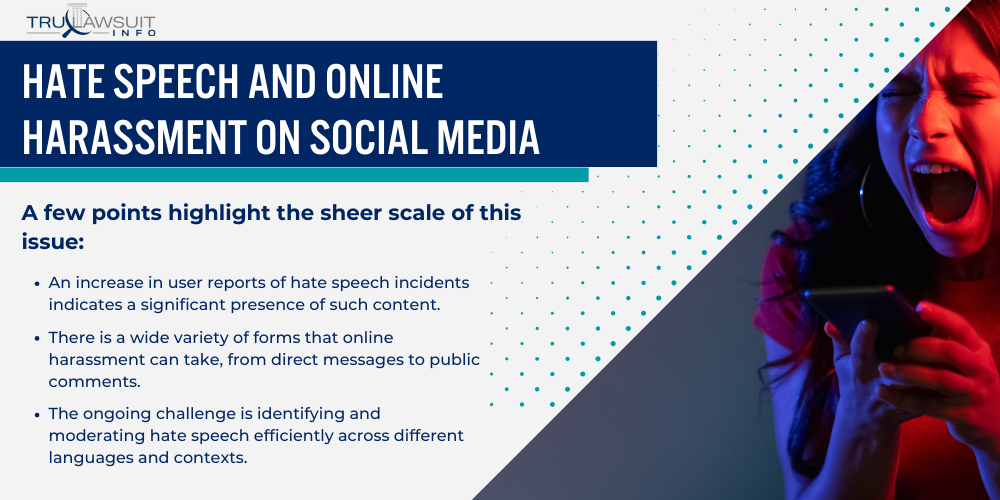
These behaviors undermine the principles of respect and responsible behavior within the online community and raise ethical issues regarding the role of these platforms in society.
Prevalence of Hate Speech and Cyberbullying on Social Media
The influx of hate speech and cyberbullying on social media platforms has necessitated a closer look at their ethical responsibility and social responsibility.
A few points highlight the sheer scale of this issue:
- An increase in user reports of hate speech incidents indicates a significant presence of such content.
- There is a wide variety of forms that online harassment can take, from direct messages to public comments.
- The ongoing challenge is identifying and moderating hate speech efficiently across different languages and contexts.
- There is a tension between protecting freedom of expression and curbing abusive behavior.
Psychological and Societal Consequences of Online Harassment
The impacts of online harassment can extend far beyond the digital sphere.
They are discernible in several disturbing trends:
- Individuals who experience cyberbullying can suffer from long-term psychological distress.
- Social fragmentation, such as hate speech, can fuel divisions within society.
- A potential chilling effect on free speech is when individuals self-censor to avoid becoming targets of harassment.
- Erosion of trust in social media platforms affects their perceived integrity and their ethical responsibility.
Privacy Concerns and Data Collection on Social Media
Privacy concerns on social media hinge on the vast amounts of personal information collected and how it is used, posing risks to information security and challenging ethical standards.

Extensive Data Collection Practices of Social Media Companies
Social media sites have integrated data collection into their core business model.
They gather various user data points, from personal preferences to interaction patterns.
This data collection is often used to tailor the user experience and provide targeted advertising, which is a significant revenue source for these platforms.
Here are some types of data that social media companies typically collect:
- User demographics such as age, gender, and location
- Engagement data, including likes, shares, and comments
- Behavioral information, tracking how users interact with various features
- Device information like IP address, browser type, and operating system
Potential Misuse and Exploitation of User Data
Misuse of the collected data can lead to serious privacy issues and even breaches of legal requirements.
There is a risk that third parties can exploit the data without users’ informed consent.
Potential risks associated with the misuse of user data include:
- Unauthorized sharing with third-party advertisers or data brokers
- Targeting and profiling based on sensitive information
- Cybersecurity threats such as identity theft or scams
- Manipulation of information, potentially impacting public opinion or elections
Social media companies must follow ethical standards and legal requirements to protect user privacy.
However, the responsibility also lies with users to be mindful of the privacy settings and the data they choose to share online.
Debate Over Content Moderation on Social Media
The ethical responsibilities of social media platforms often collide with the intricacies of moderating user content.
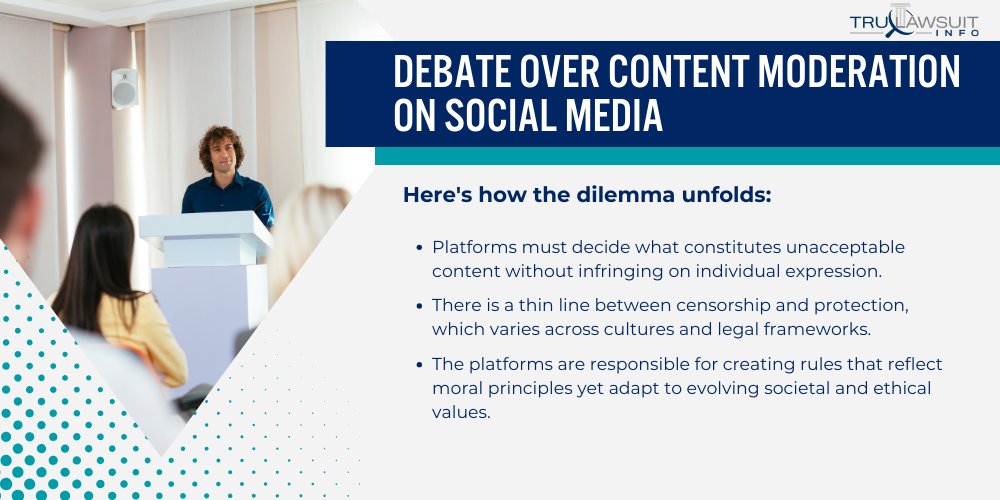
Challenges of Balancing Free Speech and Content Regulation
Social media has become a cornerstone of modern communication, fostering a global community where users express thoughts and ideas.
One key ethical issue is respecting free speech while regulating harmful content.
Here’s how the dilemma unfolds:
- Platforms must decide what constitutes unacceptable content without infringing on individual expression.
- There is a thin line between censorship and protection, which varies across cultures and legal frameworks.
- The platforms are responsible for creating rules that reflect moral principles yet adapt to evolving societal and ethical values.
- Establishing transparent processes for appeals and redress for users feeling unfairly moderated is vital.
Inconsistencies in Social Media Platforms’ Content Moderation Policies
There’s persistent debate over the discrepancies in content moderation across various social media platforms.
Several factors contribute to this:
- Criteria for what is considered offensive or harmful can vary significantly between platforms.
- The use of automated systems versus human moderators leads to different outcomes.
- A single set of rules may not be applicable or practical in every context or region.
- It is a daunting task to maintain consistency while the platforms grow and evolve.
These sections highlight the ongoing dialogue about how social media platforms should regulate content and the ethical implications of these practices.
Role of Social Media in Political Polarization
Social media’s influence on political views and public discourse is multifaceted, intertwining with ethical considerations and societal impacts.
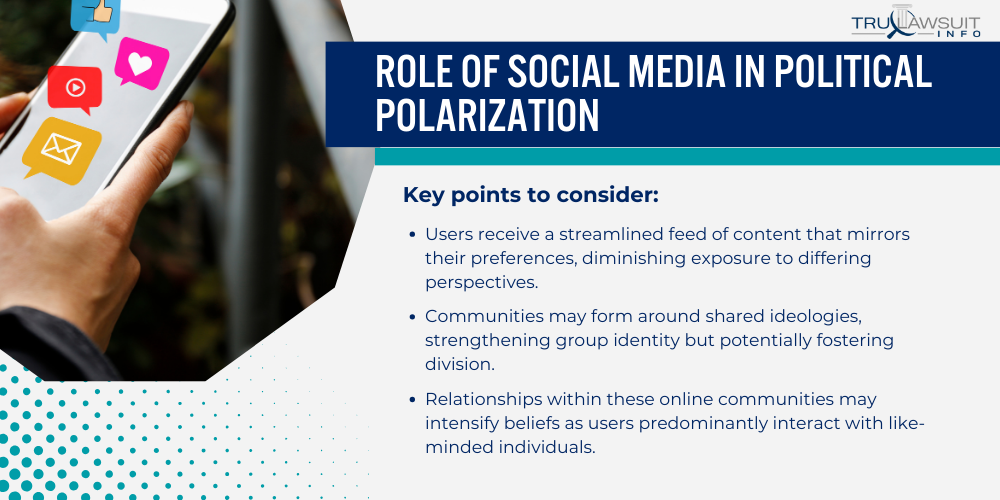
Social media platforms are central to shaping and potentially polarizing the political landscape.
Echo Chambers and Filter Bubbles Created by Social Media Algorithms
Social media postings on platforms are curated by complex algorithms, which tend to create echo chambers and filter bubbles.
These digital environments reinforce a user’s pre-existing beliefs, presenting content that aligns with their views while filtering out dissenting information.
Key points to consider:
- Users receive a streamlined feed of content that mirrors their preferences, diminishing exposure to differing perspectives.
- Communities may form around shared ideologies, strengthening group identity but potentially fostering division.
- Relationships within these online communities may intensify beliefs as users predominantly interact with like-minded individuals.
- Business models for social media marketing prioritize user engagement, occasionally at the expense of balanced information dissemination.
Impact of Social Media on Political Discourse and Democracy
The ethical responsibility of social media platforms extends to safeguarding democratic processes and fostering healthy political discourse.
However, the realities of social media’s impact on politics can be more nuanced and less deterministic.
Observations include:
- Social media can provide a diverse platform for political engagement, yet the quality of discourse can vary widely.
- Misinformation can spread rapidly, undermining informed decision-making within society.
- Society’s polarization is exacerbated when extreme or misleading content becomes viral, influencing public opinion and sentiment.
- Platforms are increasingly held accountable to moderate content, balancing free speech with societal harm reduction.
Efforts to Regulate Social Media Platforms
In an age where information spreads rapidly online, the ethical responsibility of social media platforms has taken center stage.
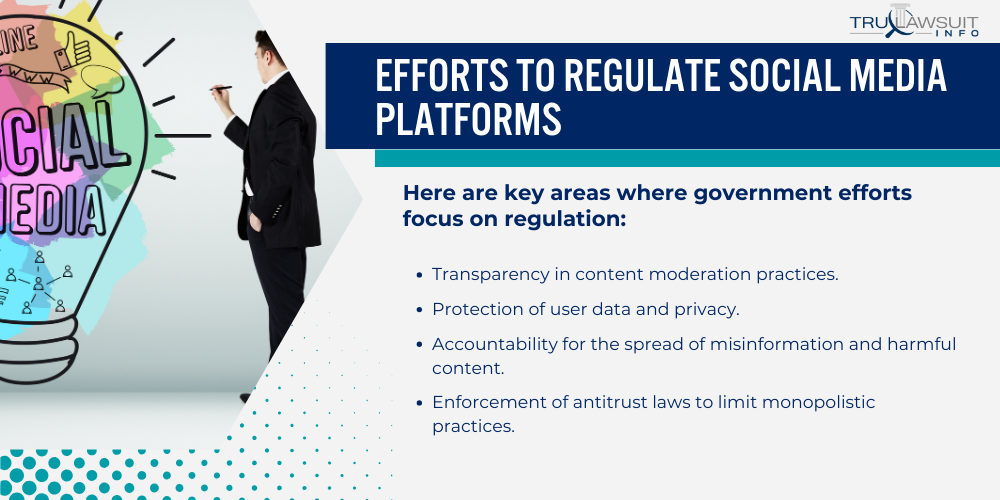
Governments and companies grapple with implementing regulations that align with guiding principles and ethics, while social media companies try to influence policies that affect their business operations.
Government Regulation of Social Media Companies
Government entities worldwide are considering legal requirements to ensure social media platforms operate within ethical boundaries.
Here are key areas where government efforts focus on regulation:
- Transparency in content moderation practices.
- Protection of user data and privacy.
- Accountability for the spread of misinformation and harmful content.
- Enforcement of antitrust laws to limit monopolistic practices.
- Support for digital literacy to empower users.
Guiding principles serve as a basis for these regulatory efforts, which aim to achieve a balance between free speech and the prevention of online harms.
Resistance and Lobbying Efforts of Social Media Giants
Social media platforms, often called companies, have mounted significant lobbying efforts to influence legislation that impacts their operations.
A focus on the following tactics has been observed:
- Engaging with business partners to create a united front.
- Providing alternative proposals to suggested regulations.
- Utilizing public relations campaigns to sway public opinion.
- Offering technical support to lawmakers to shape policies.
While these platforms are responsible to their users, they also answer to shareholders, which means business interests can sometimes drive their decisions.
The ongoing dialogue between social media companies and various stakeholders illustrates the complexity of aligning business objectives with ethical standards.
Ethical Obligations of Social Media Platforms
The ethical landscape for social media platforms involves a commitment to principles that safeguard users and the integrity of digital interactions.
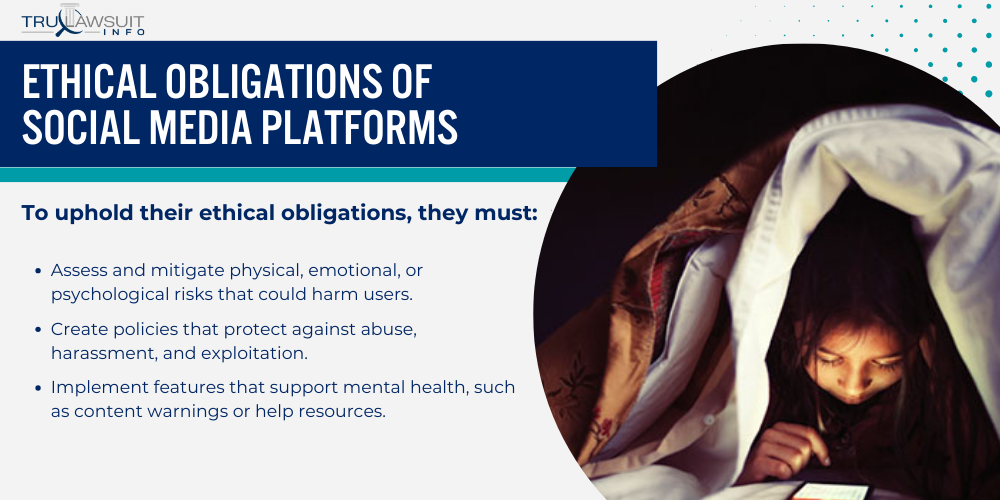
Responsibility to Prioritize User Safety and Well-Being
Social media platforms are tasked with the creation of a secure online environment.
To uphold their ethical obligations, they must:
- Assess and mitigate physical, emotional, or psychological risks that could harm users.
- Create policies that protect against abuse, harassment, and exploitation.
- Implement features that support mental health, such as content warnings or help resources.
- Foster a supportive community by encouraging positive interactions and ethical content promotion.
Need for Transparency and Accountability in Platform Policies and Practices
Transparency in platform policies ensures that users understand the ethical standards guiding their platforms.
In pursuing this, social media companies must:
- Openly communicate policy changes and the reasoning behind them.
- Provide clear guidelines on acceptable content and behavior on the platform.
- Allow the suitability of their algorithms and moderation practices to be subject to outside scrutiny.
- Uphold accountability by enforcing policies consistently and fairly across all user levels.
These efforts build trust between social media businesses and their users, generating long-term benefits for both parties.
TruLawsuit Info: #1 Social Media Lawyers
TruLawsuit Info has emerged prominently in the realm of social media law.
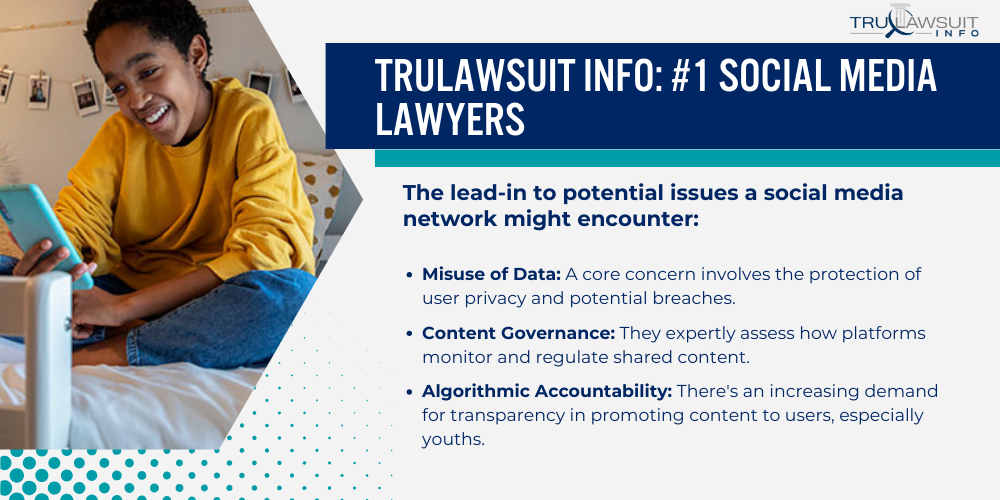
Their expertise in handling litigation tied to social media platforms has established them as a leading source of legal guidance in today’s digital landscape.
Firstly, they address the imperative legal requirements that social media companies must adhere to, striving to protect users from harm while navigating commercial information.
For those seeking detailed information on potential cases, TruLawsuit Info offers clear insights.
The lead-in to potential issues a social media network might encounter:
- Misuse of Data: A core concern involves the protection of user privacy and potential breaches.
- Content Governance: They expertly assess how platforms monitor and regulate shared content.
- Algorithmic Accountability: There’s an increasing demand for transparency in promoting content to users, especially youths.
When platforms face a PR disaster, this firm manages responsibility and defends client interests.
TruLawsuit Info is a pillar for those impacted by the unintended consequences of social media usage.
They provide further information on holding companies accountable through legal channels, highlighting the significance of ethical responsibility in the digital era.
Their neutral approach focuses on equipping clients with a clear understanding of their rights and the courses of action available to them.
TruLawsuit Info’s confident and knowledgeable stance makes them a trusted ally in a rapidly evolving online environment.
Frequently Asked Questions
-
How do social media platforms ensure user privacy and data protection?
Social media platforms implement robust encryption and data handling policies to safeguard user privacy and data protection.
They strictly regulate access to user data to prevent unauthorized sharing or breaches.
-
What measures should social media companies take to prevent the spread of misinformation?
Social media companies combat misinformation by fact-checking content and prioritizing verified information.
They engage with independent auditors to assess the effectiveness of their misinformation policies.
-
In what ways can social media platforms be held accountable for content moderation?
Platforms can be held accountable for content moderation by transparent policy enforcement and by providing users with an appeal process.
They are expected to publish transparency reports to disclose their actions regularly.
-
How should social media companies address ethical concerns regarding targeted advertising?
Social media should address targeted advertising concerns by obtaining explicit user consent and offering clear opt-out options.
Detailed user controls over data usage for advertising enhance trust and campaign transparency.
-
What role do social media platforms play in safeguarding against cyberbullying and harassment?
They play a vital role in implementing strict policies and real-time monitoring tools to detect and address cyberbullying.
Prompt action and support for affected users reinforce the platform’s commitment to safety.
-
What best practices can social media platforms follow to promote digital literacy and responsible usage?
Platforms can provide educational resources and collaborate with experts to promote digital literacy and create awareness campaigns.
Interactive tools that help users critically evaluate content encourage responsible usage.

Experienced Attorney & Legal SaaS CEO
With over 25 years of legal experience, Jessie is an Illinois lawyer, a CPA, and a mother of three. She spent the first decade of her career working as an international tax attorney at Deloitte.
In 2009, Jessie co-founded her own law firm with her husband – which has scaled to over 30 employees since its conception.
In 2016, Jessie founded TruLaw, which allows her to collaborate with attorneys and legal experts across the United States on a daily basis. This hypervaluable network of experts is what enables her to share reliable legal information with her readers!
Have A Case?
Here, at Tru Lawsuit Info, we’re committed to helping victims get the justice they deserve.
To do this, we actively work to connect them with attorneys who are experts in litigating cases similar to theirs.
Would you like our help?
Tru Lawsuit Info is a reliable source of information about issues that may affect your health and safety, such as faulty products, data breaches, and environmental hazards.
Our team of experienced writers collaborates with medical professionals, lawyers, and advocates to produce informative articles, guides, and other resources that raise awareness of these topics.
Our thorough research provides consumers with access to reliable information and updates on lawsuits happening around the country. We also can connect consumers with attorneys if they need assistance.
Camp Lejeune's water contamination issue spanned several decades starting in the 1950s. Exposure to these chemicals has been linked to various serious health issues, including cancer, organ diseases, and death.
Research is increasingly suggesting a link between the use of Tylenol during pregnancy and the development of neurodevelopmental disorders, such as autism and ADHD, in infants.
Legal action is being taken against manufacturers of Aqueous Film-Forming Foam (AFFF), a chemical used in fighting fires. The plaintiffs allege that exposure to the foam caused health issues such as cancer, organ damage, and birth and fertility issues.
Have A Case?
Here, at Tru Lawsuit Info, we’re committed to helping victims get the justice they deserve.
To do this, we actively work to connect them with attorneys who are experts in litigating cases similar to theirs.
Would you like our help?







